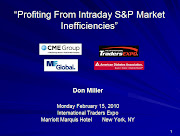Some final weekend thoughts before heading back to work on Monday.
Dangers of Managing "To" Statistics - While I'm going to wait for December 31 for a full lookback at my 2008 statistics (again, I find them to be more of an amusing after-the-fact anecdote than anything, and even then it will be less than a 5-minute exercise and not be particularly important), I thought it might be helpful to use my 2008 stats to date to reinforce a few points regarding the relevance -- or lack thereof -- of looking at performance on specific timeframes.
So let's start with the data, noting the timeframe, relevance, and 2008 win vs. total:
Specific Trade - Completely Irrelevant - Not tracked
Day - Largely Irrelevant - 78% (164/209)
Week - Somewhat Relevant - 91% (39/43)
Monthly - Relevant - 100% (10/10)**
Quarterly - Highly Relevant - 100% (4/4)**
Annual - Critically Relevant - 100% (1/1)**
** Period in progress; Data reflects performance through last Friday
And while we're clearly missing an important piece of the analysis, which is dollar extent of the gains & losses ... an analysis of which I'll defer to 12/31 (in the meantime, the previously posted month-end equity curves provide clear clues, and yes, one large loss can negate a 91% win/loss %), here are some observations.
First, I consider the first two timeframes to be pretty meaningless as I don't focus on them whatsoever. And while cumulative performance as reflected on larger timeframes clearly wouldn't occur without some decent performance on these micro-timeframes, it's more a matter of "they are what they are", versus "I need to manage to them" ... i.e. "I'd better make damn sure I don't end this trade or day with a loss."
And that's where I believe many newbies and losing traders -- including this trader when he was a newbie many moons ago -- lose their perspective in the heat of the battle. For there's a huge difference between trying to manage to a desired statistic, versus looking back at stats as interesting after-the-fact sidebar. Pursuing the former leads to misplaced actions such as doubling down where trade premises have clearly busted and last hour revenge trading when faced with a potential day's loss.
Second, it's interesting to note that the daily and weekly win/loss %s are about where I would expect them. Again, there's been no trying to manage to them ... the #s are what they are -- a simple fallout of performance. They just happen to make sense in the scheme of things.
I've mentioned many times that former Engineers, Accountants, and Statisticians typically make terrible traders. And that's not meant to be disparaging at all, as I have some Accounting blood in me and once had the world's best accounting of a losing trading business. It's just that those that succeed typically do so in spite of their past talents, not because of them.
There are several reasons I keep that December 31 countdown to the left. The main reason is that on that day, the year's "trade" will be closed. Yet even then, 2008 will reflect a small subset of one's "career" trade, which in the end is the only trade that matters.
Perhaps we should keep that in mind when slipping into anaylsis paralysis when determining whether our ES pullback entry in a 5-min trend will be a win or loss. React, and the results will take care of themselves.
Enjoy the rest of your weekend, and we'll open up the PalTalk room at 6:30pm ET tonight for virtual drinks at 7pm.
Sunday, October 26, 2008
Subscribe to:
Post Comments (Atom)
















No comments:
Post a Comment